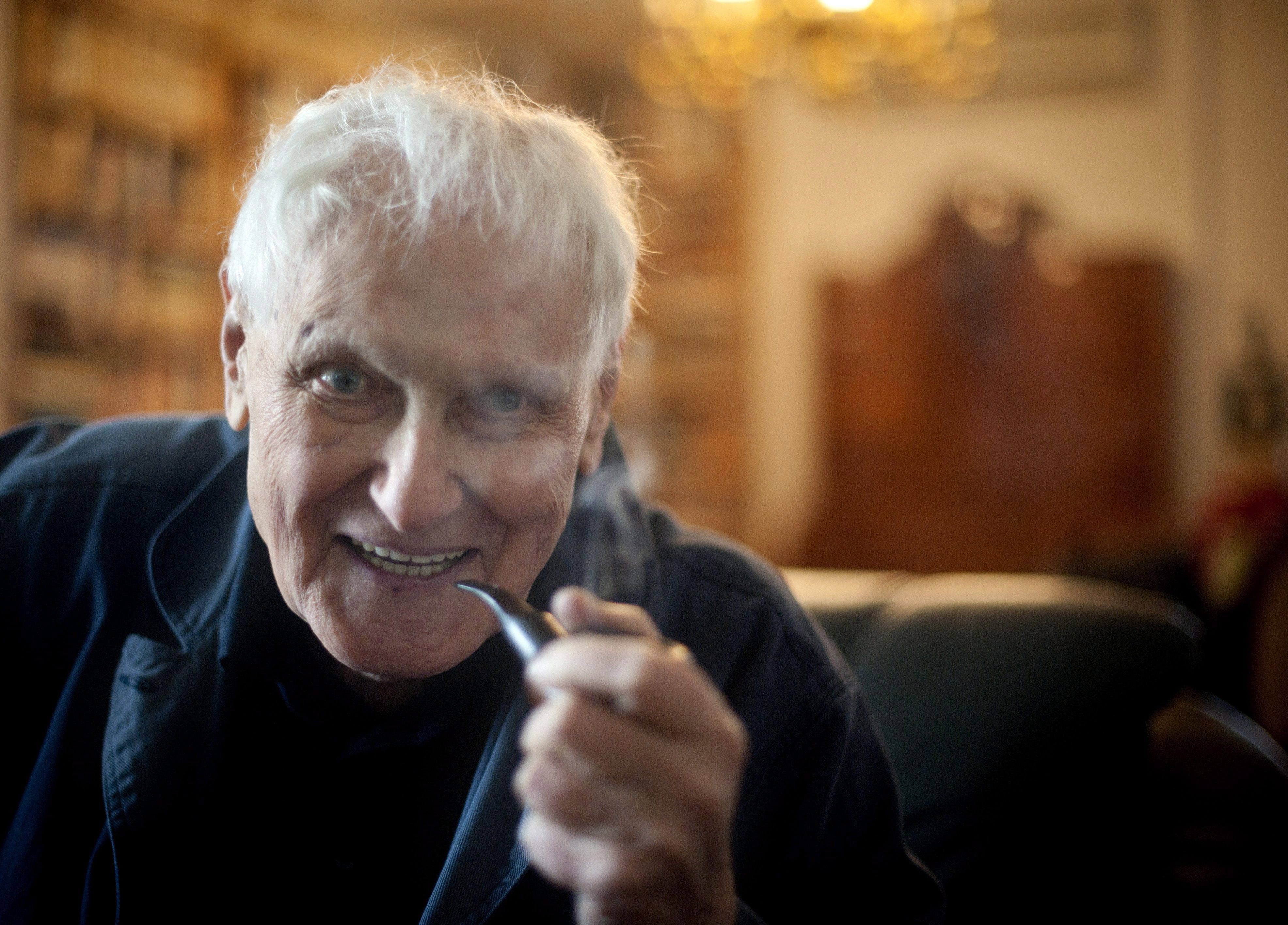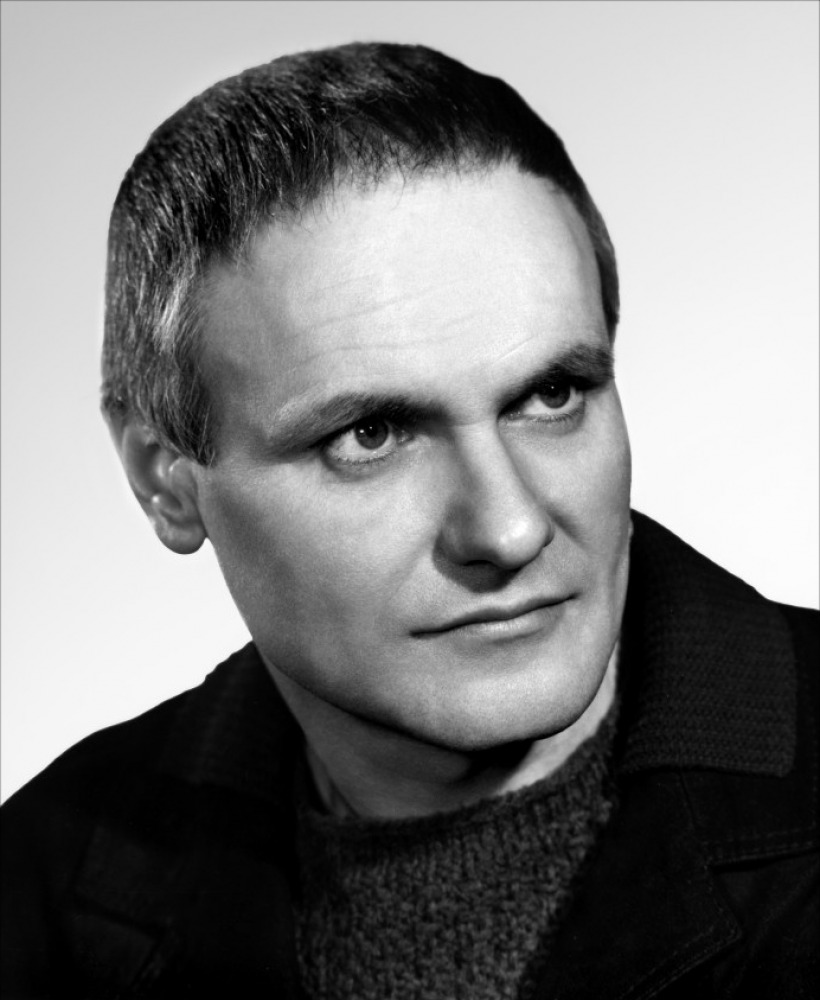|
|
||
|
Pro Tools
FILMFESTIVALS | 24/7 world wide coverageWelcome ! Enjoy the best of both worlds: Film & Festival News, exploring the best of the film festivals community. Launched in 1995, relentlessly connecting films to festivals, documenting and promoting festivals worldwide. We are sorry for this ongoing disruption. We are working on it. Please Do Not Publish until this message disappears. For collaboration, editorial contributions, or publicity, please send us an email here. User login |
Jancso reassessed at Bergamo
The 34th Bergamo Film Meeting closed out an eleven day run on a rainy Sunday, March 13, with two Jancsò classics, "The Roundup" and "Red and White" to wind up a nearly full retrosoective of the great Hungarian director's fearure films and many of his shorter works as well. Miklos Jancsó passed away in Budapest on January 31, 2014 at the age of 92.
JANCSO at his peak could have played Olivier's Hamlet ... The Round-Up, 1965. (b/w), starring Janos Görbe and Zoltan Latinovits, two of Hungary's biggest film actors. The Round-Up (Hungarian: Szegénylegények, "Outlaws") is a 1965 Hungarian film which was well received in its home country, and was Jancsó's first film to receive international acclaim. Festured are two of Hungary's biggest film actors, Janis Görbe, and Zoltan Latinovits. Today many consider The Round-Up a classic of world cinema; it screened in the Cannes Classics section in 2015. My assessment in Bergamo: Pretty boring. I fell asleep at the halfway mark after Görbe and Latinovits were killed and put out of the picture. In my opinion highly overrated. Too much cruelty for cruelty's sake -- notably the beating to death of the the beautiful nude forced to run the soldiers gamut -- Give me Pink Flamingos. After relishing a lineup of fifteen Jancsó features I finally got tired of the arbitrary brutality, pointless interrogations and robot like acting. If ever there was a director to whom actors were so many sheep, it was far more Jancsó than Hitchcock. Jancso fid not get the Best out of his actirs -- he went for the weirdness in them. I liked his colorful pre-Bollywood (but very much Bollywood like!) group dance dramas which were much more visually engaging than The Roundup or Csillagosok, Katonak (the Red and the White). The latter was the last film of the festival and, frankly, I coudn't wait for it to be over. Totally boring compared to his other mass interrogation and arbitrary killing films, which at least have the saving grace of great dance numbers and rousing music (a la Bollywood). Jancso's rampant use of female nudity is basically pornographic altho there's nothing wrong with good pornograhy. I am a fan of Deep Throat and The Devil In Miss Jones. It is clear, however, that Jancsó got his rocks off by getting all these juicy zoftic young women to strip for him. A Hungarian gal I know who worked for Jancsó about ten years says she found him in person to be an unrelenting dirty old man and male chauvinist pig. She was in her twenties and was hired as a gopher by Jancso when he read a screenplay she submitted to the Film School in Budapest and thought she had talent. But it turned out, says Emilia, that he was more interested in pinching her bottom and mashing her buns than in her film savvy. Jancsos films are basically political and social lectures, but after a while one gets tired of lectures and longs for something else. This he supplies in ample volume in his better Bollywood films such as Agnus Dei and Red Psalm -- and they are fun to watch in spite of the purposefully confusing narration. Here Antonio and Mizoguchi are far superior -- in the way they convey their equally high moral-ethical-critical messages. At his best Jancso is a great Entertainer -- yes -- an entertainer -- at least he entertains me. At his worst, or let us say, " less than best" , in films such as Roundup and Red and White, he can get pretty damn boring. A big problem in Red/white was simply trying to keep track of Who's on First ~~ who is up against whom, and why. Of course Jancsó was basically lecturing to Hungarian auds who are familiar with all the symbolic and historical references. I simply gave up after a while and took a nap. One very pretty girl in there looked a lot like Anna Karina seen immediately before in Godard's Vivre Sa Vie. As for his other Italian outing, "Private Vices, Public Virtues", 1976, which is basically a soft porn prequel to Guccione's mainstream porno of 1979, CALIGULA -- it was in Italian with no subtitles and generally tedious, so I gave it a walkout after mebbe half an hour. Interestingly, actress Teresa Ann Savoy is in both pictures.
------------------------------------- . Following the quelling of Lajos Kossuth's 1848 revolution against Habsburg rule in Hungary, prison camps were set up for people suspected of being Kossuth's supporters. Around 20 years later, some members of highwayman Sándor Rózsa's guerrilla band, believed to be some of Kossuth's last supporters, are known to be interned among the prisoners in a camp. The prison staff try to identify the rebels and find out if Sándor is among them using various means of mental and physical torture and trickery. When one of the guerrillas, János Gajdar, is identified as a murderer by an old woman, he starts aiding his captors by acting as an informant. Gajdar is told that if he can show his captors a man who has killed more people than himself, he will be spared. Fearing for his life, he turns in several people his captors had been looking for by name, but could not identify among the prisoners. Eventually Gajdar becomes an outcast among the prisoners, and is murdered at night by some of his fellow inmates while in solitary confinement. The prison guards easily discover suspects, people whose cells had been left unlocked for the night, and start interrogating them with hope of finding Sándor himself. The suspects are tricked into revealing the remaining guerrillas when they are given a chance to form a new military unit out of former bandits and informed that Sándor, who was not among the prisoners, has been pardoned. However, the celebrating guerrillas are then told that those who previously fought under him, will still face execution. Main Cast of The Roundup: János Görbe as János Gajda, Zoltán Latinovits (regarded by many as the greatest a Hungarian actor of all time), András Kozák as Kaba Jr., József Madaras as Magyardolmányo, János Koltai as Béla Varju. Production The Round-Up was produced by the Hungarian state film production company, Mafilm. It had a budget of 17 million forints, or half a million US$ at the exchange rates of the time. Thw cinematography was by by another regular Jancsó collaborator, Tamás Somló. The Round-Up does not exhibit many of Jancsó's trademark elements to the degree evident later. In it the takes are rekatively short and while the camera movements are carefully choreographed they do not exhibit the elaborate fluid style that would become distinctive in later films. The film does, though, use Jancsó's favourite setting, the Hungarian (The Puszta , or Central Prairie), and was shot in characteristically oppressive sunlight. The film has little dialogue and rarely shows any emotion in its characters. It has been called by one critic as "a total absorption of content into form". Good call! The gamut scene where a beautiful naked young women is run through a wall of soldiers flogging her mercilessly until she is beaten to death -- for no apparent reason other than getting their kicks and titialating the audience's S-M predilections -- I would call total pornography for sado-masochists, on and off screen.
Critical reception The film was well received by audiences on its initial release in Hungary. During its theatrical run, the film was seen by over a million people, in a country with a population of around ten million at the time. It was selected as the Hungarian entry for the Best Fireign Language Film at the 39th Academy Aapwards innHollywood, but did not make the final cut and was not accepted as a nominee. The Round-Up was Jancsó's first film to receive international attention. It was the first of five of his films to be entered in the competition category, at the 1966 Cannes Film Festival, but failed to win any awards. The brutal, dictatorial methods depicted in the film were read by local audiences as an allegory for the clampdown that followed Hungary's failed 1956 uprising against the Soviet Army. Before Jancsó was allowed to screen the film in Cannes, he had to make a declaration stating the film had nothing to do with the recent events in the country, even though he later said that "everybody knew this was nothing but eyewash. Later in 1966, the film was released in the United Kingdom, and in 1969, it received a limited release in the United States. The film was included in Bella Tarr't list of the 10 greatest films of all time submitted to the 2012 Sight &Sound poll, as well as Stuffy British critic Derek Malcolm's The Century of Films, a list of 100 of the critic's favorite movies movies of the XX. century. My view: Boring. highly overrated. Looks and feels like an open air Concentration camp. Extreme cruelty throughout began to get on my nerves After Latinovits and Görbe were put out out of their misery and left the scene I lost interest and dozed until the end, waking up in time for a ragged cavalry charge by guys in white against the guys in black. Never could figure out who won because I couldn't figure out who I was supposed to be rooting for. And that was it for Bergamo, 34., 2016. One wonders if Jancsó did not himself relish the brutality he showed so vividly in his films. The ever present full nudity and mistreatment of juicy young woman is another point of questionability. not exactly pornography, but not exactly not pornography either. Aside from his personal visual preferences, Jancso was a harsh thorny critic of Hungarian society -- religion, politics, hypocrisy, historical revisionism and everything else. The national gadfly. Part of his notoriety undoubtedly rests on this, but he was also an undeniable innovator of cinematic mise-en-scene creating a style on a large scale completely his own -- which made him such a favorite of the more snooty film critics and even some average people who just appreciate a heady colorful ride across the screen with big song and dance numbers. And horse lovers will have enough meat for a lifetime. I personally have no qualms about calling his middle films Glorified Bollywood Horse Operas -- however, i am a big Bollywood fan and, as a card carrying D.O.M., love to ogle naked young women, and love horse operas so, basically, i must admit to being a Jancsó fan.
And he loved them naked young women .... to Death! By Alex "Sanyi" Deleon, <filmfestivals.con> 22.03.2016 | ALEX FARBA's blog Cat. :
|
LinksThe Bulletin Board > The Bulletin Board Blog Following News Interview with EFM (Berlin) Director
Interview with IFTA Chairman (AFM)
Interview with Cannes Marche du Film Director
Filmfestivals.com dailies live coverage from > Live from India
Useful links for the indies: > Big files transfer
+ SUBSCRIBE to the weekly Newsletter DealsUser imagesAbout ALEX FARBAThe Editor |
































